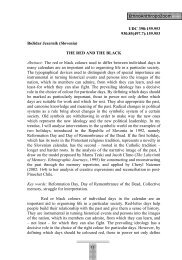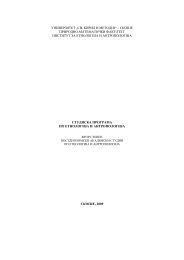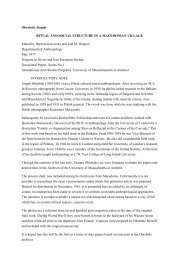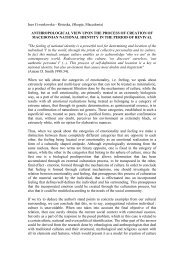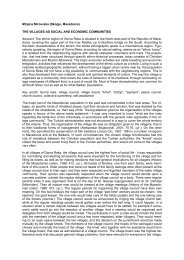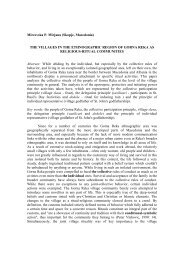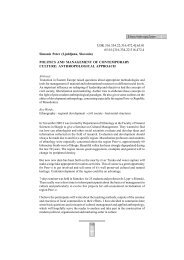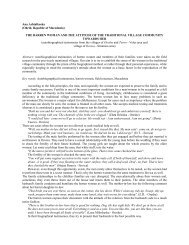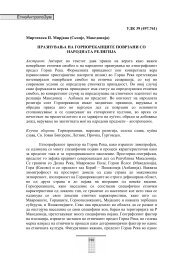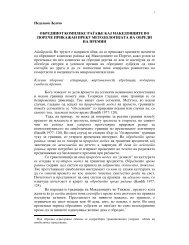Halpern M. Joel, Kerewsky-Halpern Barbara (USA)
Halpern M. Joel, Kerewsky-Halpern Barbara (USA)
Halpern M. Joel, Kerewsky-Halpern Barbara (USA)
You also want an ePaper? Increase the reach of your titles
YUMPU automatically turns print PDFs into web optimized ePapers that Google loves.
12345<br />
12345<br />
12345<br />
12345<br />
12345<br />
12345<br />
12345<br />
12345<br />
12345<br />
12345<br />
12345678901234567890123456789012123<br />
12345678901234567890123456789012123<br />
EthnoAnthropoZoom<br />
12345678901234567890123456789012123<br />
12345678901234567890123456789012123<br />
12345678901234567890123456789012123<br />
The area around Bitola is very rich in archeological sites, having had Greek and then<br />
Roman settlements. Immediately outside the city is the excavation site of the Greek<br />
community of Heraclea, with carved stone friezes, well-preserved pillars and a clear<br />
outline of the buildings. We were taken there by a very sweet student of archeology<br />
and art, about my age (<strong>Barbara</strong>’s). She certainly was a pleasure after the dud we had<br />
had the day before. After we were talked out on more lofty subjects we turned to the<br />
problem of where or how one could wash one’s hair here, as the hotel had only a tiny<br />
sink with cold running water. Even to have it functioning was something special. Our<br />
friend Gospodjica (Miss) D offered to let us wash our hair at the museum early the next<br />
morning. She explained that the women who cleaned there would take care of everything.<br />
Sure enough the next morning out in the yard behind the museum all was ready. There<br />
was a big pot of boiling water and a wooden trough to serve as a basin. This might not<br />
have seemed so nice it we had we not been accustomed to life in the village for so long.<br />
We were, however, extremely satisfied. Than I had to go buy a heap, cotton peasant<br />
kerchief as all of mine were begged off me by various Orasac babe. (Older women)<br />
So, with wet but clean heads, and feeling good because the car showed up on time, for<br />
a change, with the man who had received us the day before. (It was easy for us to get<br />
accustomed to our somewhat privileged status.) We drove first to an archeological<br />
site several miles outside of town. The director of museum was staying here to direct<br />
the excavation. The laborers were peasants paid for the purpose. Sometimes they were<br />
assisted by school children on a excursion who were given the fun and excitement of<br />
volunteering to help out. The camp was interesting. There were two tents, a makeshift<br />
kitchen of woven reed mats propped on poles around an enclosed area which contained<br />
a shelf, chest and wood stove. There was a small table with camp stools grouped under<br />
a tremendous bright red beach umbrella. This could be seen for miles in all directions.<br />
We had even seen it from the train the day before.<br />
The museum director is an enthusiastic, happy sort of person, the kind there should be<br />
more of here. He was versed in <strong>Joel</strong>’s work and when he heard we were going to<br />
villages he immediately pulled on a shirt and in his shorts and house slippers went out<br />
to the car with us and came along. The place we went to is called Srpci Pa{a. It is a field<br />
type (a clustered settlement with surrounding fields) Orthodox village near Bitola. As<br />
we walked up the path to the village the first thing we saw was round blobs of patties<br />
of animal dung drying in the sun on all the low mud fences. We were told that they<br />
would be used as fuel. There is no wood in this area and the corncobs that they had<br />
been using all winter were now gone. The houses are of stone and mud. Some of them<br />
are raised off the ground level with crude wooden planking. Most of them have dirt<br />
floors and are very dirty. (Clearly there was an ambivalence in our attitudes. We found<br />
the costumes intriguing, the people friendly but they were also poor, one might say, in<br />
general, poorer than in Serbia and certainly more so than in Croatia although the<br />
differences were not absolute. As noted we had been in Bosnia. We also visited<br />
Kosovo, the poorest region of Yugoslavia but there we did not have any direct contact<br />
with villagers. It is worth briefly noting that in 1993-94 when I visited Albania and had<br />
a chance to travel in rural areas of the north – the conditions in villagers there, some<br />
four decades later, appeared similar in terms of general standard of living.)<br />
153<br />
12345<br />
12345



